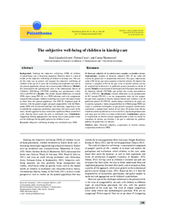Abstract
Background: Studying the subjective well-being (SWB) of children in out-of-home care is becoming important. However, there is a lack of results on the subjective well-being of children in kinship care. The aim of this study was to analyse and compare the subjective well-being of children at the age of 12 years old in kinship and residential care and in the general population, taking into account gender differences.
Method: We administered the questionnaire used in the International Survey of Children’s Well-Being (ISCWeB) including two psychometric scales (OLS and PWI-SC).
Results: The results showed differences in overall SWB scores (using PWI-SC as a SWB indicator) and in its components among the three groups: children in kinship care scores were more similar to those from the general population. The PWI-SC displayed good fit statistics with the pooled sample and good comparability with the Multigroup SEM with constrained loadings and intercepts, suggesting it was acceptable for comparing correlation, regressions and mean scores of the items. Gender appeared to have statistically signifi cant effects on the OLS scale, showing lower scores for girls in residential care.
Conclusions: Supporting kinship appropriately and taking into account gender issues are the challenges facing public policies for children in care.

